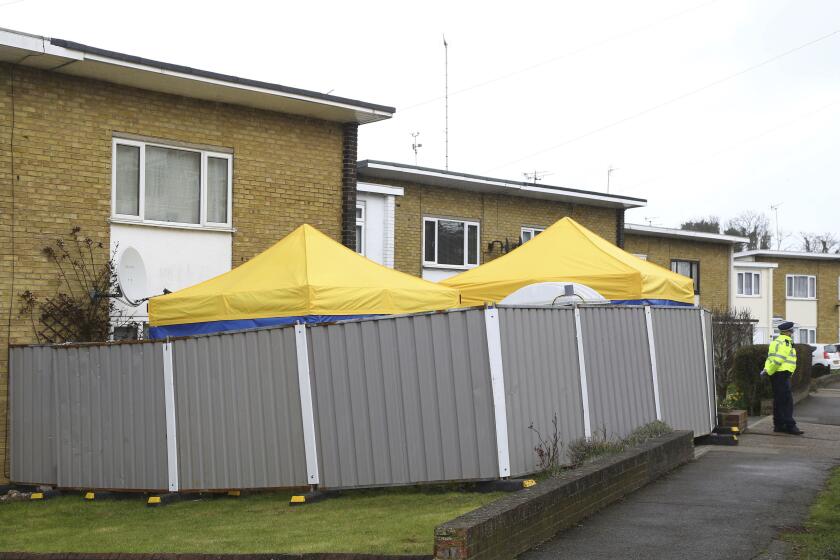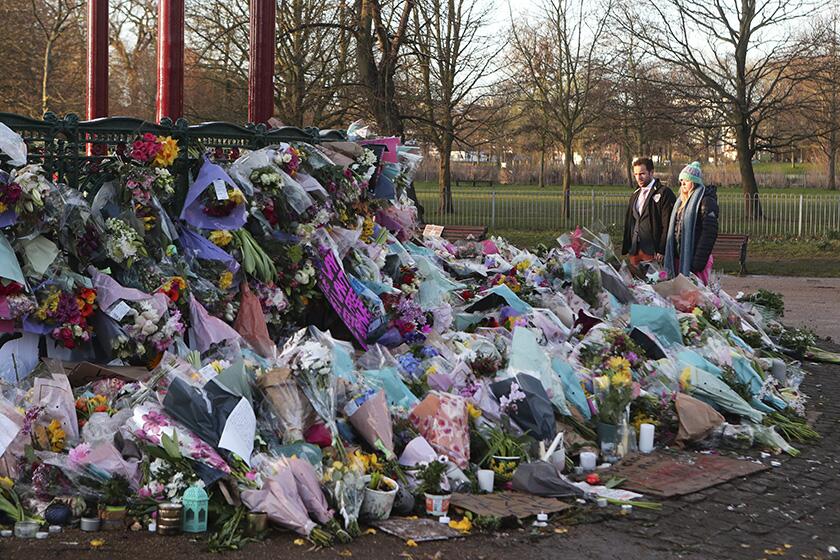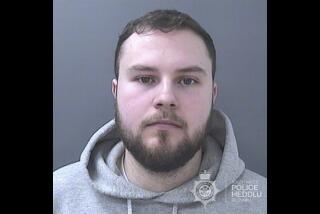London police officer gets life for woman’s slaying that sparked national outcry

LONDON — A London police officer was sentenced to life in prison without the possibility of parole Thursday for the kidnapping, rape and murder of 33-year-old Sarah Everard, whose death caused a nationwide uproar over women’s safety.
Wayne Couzens, 48, was accused of misusing his police authority and falsely arresting Everard on suspicion of violating lockdown restrictions as she walked home from visiting a friend in South London on March 3. Prosecutors said he handcuffed Everard, drove her far outside the city, and then raped and killed her.
Couzens had pleaded guilty to the charges.
In handing down the sentence, Justice Adrian Fulford said that Couzens misused his role as a police officer and that the circumstances of the case were “devastating, tragic and wholly brutal.” Couzens went “hunting a lone female to kidnap and rape,” having planned the crime in “unspeakably” grim detail, the judge said.
“You have eroded the confidence that the public are entitled to have in the police forces of England and Wales,” he said.
The seriousness of the case was so “exceptionally high” that it warranted a life sentence, Fulford added. The sentence means that Couzens will die in prison.
The suspected abduction and murder of a young London woman as she walked home has dismayed Britain and revived painful questions about women’s safety.
The body of Everard, a marketing executive, was found in a wooded area in Ashford, about 50 miles southeast of London, a week after she went missing. Prosecutors said Couzens had strangled her with his police belt before setting fire to her body.
Everard’s slaying and Couzens’ arrest shocked the nation and raised questions about trust in police. London’s Metropolitan Police department has said it was “sickened, angered and devastated” that one of its own was responsible for the crime.
The case touched a nerve with women in particular because Everard was abducted while walking home along well-lighted areas of Clapham and Brixton — urban, busy areas of the capital frequented by scores of women and girls every day. Major public protests over women’s safety followed.
“No woman should have to fear harassment or violence. We will do everything possible to prevent these abhorrent crimes and keep our communities safe,” British Prime Minister Boris Johnson said after Thursday’s sentencing.
London police stirred outrage when officers clashed with women at a vigil for another woman whom an officer is accused of murdering.
Couzens was arrested at his home in Deal in southeastern England after police connected him to a rental car he used to abduct Everard.
He joined the Metropolitan Police, also known as Scotland Yard, in 2018 and had worked as part of a team protecting diplomatic locations in central London. He had worked an overnight shift at the U.S. Embassy on the day he kidnapped Everard.
In the aftermath of Everard’s killing, many questioned how police vet prospective officers, while others criticized Scotland Yard for not doing enough to protect women and girls and to tackle allegations of sexual violence.
After Couzens’ arrest, it emerged that he had been accused of indecent exposure at least twice before he murdered Everard, and police are being investigated over whether the allegations were dealt with properly.
News Alerts
Get breaking news, investigations, analysis and more signature journalism from the Los Angeles Times in your inbox.
You may occasionally receive promotional content from the Los Angeles Times.
Labor Party lawmaker Harriet Harman renewed calls for Cressida Dick, the Metropolitan Police’s first female chief, to step down to allow for the implementation of urgent reforms, including the immediate suspension of officers accused of violence against women.
“Women need to be confident that the police are there to make them safe, not to put them at risk,” Harman wrote in a letter to Dick. “Women need to be able to trust the police, not to fear them.”
More to Read
Sign up for Essential California
The most important California stories and recommendations in your inbox every morning.
You may occasionally receive promotional content from the Los Angeles Times.












